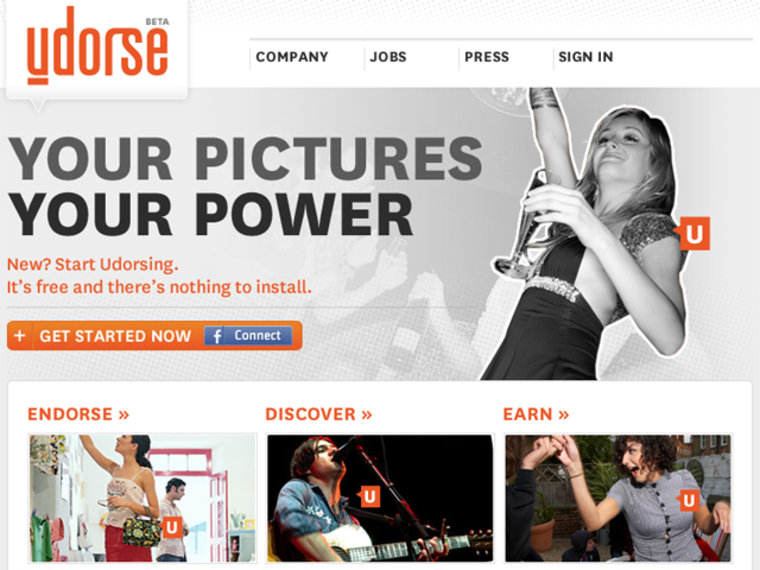One day soon, our society will be ruled by an all-intrusive advertising technique in which individuals are paid to walk around 24/7 holding a product next to their wide-smiling faces.
This was just one of the uncanny predications a well-read, pot-smoking hippie, conspiracy-freak friend predicted way back in the early ‘90s. And when it came to pass, my paranoid pal assured, he’d be safely off the grid, well hidden in the rain forests of Costa Rica where Madison Avenue — or the InterWebs — would never find him.
This same friend also maintains that Nazis invented aspartame. I don’t know about that, but more than 15 years later, even though that friend is still living in the Pepsi commercial that is now Williamsburg, Brooklyn (and not Costa Rica), and just this year joined Facebook, I’m more than a little freaked out that his personal-advertising premonition may be happening — especially if one hot new Internet startup, Udorse, becomes a success.
Describing itself as a “visual endorsement engine,” Udorse launched its beta-testing version at September’s TechCrunch50, a startup conference held by the technology blog. But even before that auspicious debut, the startup had received $500,000 in backing from Founders Fund, the same company that bankrolled Facebook.
What does Udorse do? It makes all those hundreds of lazy, freeloading photos you’ve been uploading to Facebook, Flickr, eBlogger, whatever, finally earn their keep!
OK. Anthropomorphizing your digital trail aside, the Udorse platform lets “you endorse” the objects or locations in your online photos by tagging them with your comments and links to the products’ Web site. You also receive a nominal percentage of revenue for each friend who clicks on tags that belong to Udorse partners. (The two big names so far are Armani Exchange and American Apparel, as well as 15 or so smaller retailers and restaurants.)
“The whole idea is about empowering companies or brands you’re passionate about,” Udorse founder and CEO Geoffrey Lewis said in a telephone interview chock full of public-relations speak. In other words, you’re not going to get rich. While Udorse is still in its testing phase with a couple thousand invited users, Lewis predicts that once the tool launches to the public this holiday season, even the shoppiest Udorser can only expect to make maybe $5 to $10 monthly. (P.S. You can also choose to donate that money to your favorite charity.)
So why bother? I mean, you’ve got “Mafia Wars” to fight and imaginary petting zoos to maintain, right?
Well, there is the outside chance, according to Lewis, that if your taste-maker kung fu is good, you just might have an outside chance — possibly, maybe — to land an endorsement deal with your favorite company (and you don’t even have to shoot steroids!).
Aside from that, there’s a “natural endorsement” (there’s that PR speak I mentioned) to every photo people choose to share with others online, says Lewis, who incidentally is a former Procter & Gamble brand manager, who also did that hedge fund thing pre-Udorse.
Be it clothing, restaurant, bar, concert, gadget, sneaker, vacation spot or snowboard, Lewis says, the things you’re posing with are things you want other people to know about. “Brands are shorthand for what people want to say about themselves, but don’t know how to articulate it.”
So, essentially, if this thing works, it’s because Udorse successfully tapped into our ever expanding too-much-information-me-me-me-enough-about-me-what-do-you-think-of-me-and-also-what-do-you-think-of-this-random-crap-I-bought culture already supported by Facebook and reality television.
Creeped out? Yeah, so was Zappos CEO Tony Hsieh, a TechCrunch50 panelist who found the idea of his friends buying the same outfits “a little weird.”
My BFF Ree Hines felt the same way. “Remember back in the olden days when you’d buy something really cool and you didn’t want anyone else to have it because it meant ‘I’m cooler than you?’ ” she said, wistfully citing an acquaintance who still makes up fake names for her Mac eye shadows when asked because she doesn’t want to share.
Yeah, I guess I could rant about our gross self-obsessed consumer culture like I’m wont to do, but frankly we’re bombarded with this stuff. At least Udorse is voluntary. It’s not like your wife is going to pop up in a “Singles in Your Area” ad on your profile. (Yeah, you heard me, Facebook.)
What’s more, Udorse cuts out the middle man. Say your BFF sends you a Gmail about Mac eye shadow. Now you’ve got, like, 10 Mac eye shadow ads on your screen, courtesy of the creepy Google ‘bot that reads your e-mail. And not a one of them may link to the exact product your BFF is trying to hook you up with! Not so with Udorse … allegedly.
Is society that self- and brand-obsessed to make Udorse work? Will a purchase-driven tool succeed in this economy? “Will my friends try to trick me into buying crap I hate or will their current behavior — wearing crap, droning on and on about TiVo, etc. — just get ‘monetized?’ ” as my cranky network nerd pal Daniel Harrison (who hates consumer me-ism sometimes even more than me) grouses?
Daniel’s big fear? “That first friend who's like, ‘Hey, I'm out of a job but I'm standing next to a Ford in this picture. You're buying a car, right? Gimme a percentage!’”
Follow Helen A.S. Popkin on as she attempts to profit from her online friends, or just friend her on , where she will attempt to sell you the Brooklyn Bridge. Cheap.
